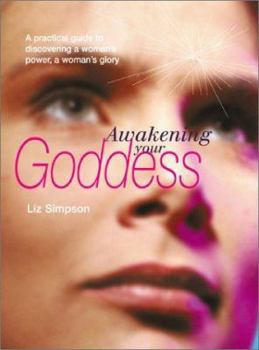Awakening Your Goddess: A Practical Guide to Discovering a Woman's Power, a Woman's Glory
Select Format
Select Condition 
Book Overview
Simpson points out how every woman's life is influenced by goddess archetypes and then advises on how to create a balance among them to create a personal wholeness. Full color. This description may be from another edition of this product.
Format:Paperback
Language:English
ISBN:0764116479
ISBN13:9780764116476
Release Date:January 2001
Publisher:Barron's Educational Series
Length:143 Pages
Weight:0.90 lbs.
Dimensions:1.0" x 7.1" x 9.8"
Customer Reviews
1 rating
(3.5) An intro to Goddess-based self-help
Published by Thriftbooks.com User , 22 years ago
This book looks like a fashion magazine, perhaps a guide to "awakening your Goddess" by careful makeup application. LOL. I alsmot didn't buy it because I thought it was about fashion and beauty. Of course, the book's appearance could be an asset as well as a hindrance--if I can make that mistake, someone else could make the opposite mistake, thinking the book was about makeup and ending up learning something. So maybe the cover is intended to appeal to people who would normally be put off by "New Age" or "occult" stuff. Makes sense. _Awakening Your Goddess_ deals with feminine archetypes from ancient pagan religions, but would not be intimidatingly "occult-y" to a person who doesn't normally read that sort of thing._Awakening Your Goddess_ begins with an oversimplified version of the matriarchy theory. You know the one: Everybody lived happily and peacefully, worshipping the Great Mother, until the Big Bad Invaders from the North showed up, inventing war and banishing goddesses from the pantheon. You'll want your shaker of salt handy for this section.The book gets better when it explores the actual goddesses. From Kwan Yin to Kali, from the Cailleach to Artemis, Liz Simpson gives the basic myth of each goddess and then a list of her "functional" and "dysfunctional" qualities--which can show up in human women's personalities. For example, it's good that Artemis is "independent", but she runs into trouble because she is "ruthless". You get the idea. Simpson provides tips for developing or downplaying the goddesses' personality traits in your own life. Meditation, altar creation, journaling, and various other activities are recommended. It's not the deepest-delving goddess-psych book I've seen, but it is a good intro and pretty insightful.It's not perfect--Simpson seems blind to the good sides of some goddesses and the bad sides of others. The Welsh goddesses Cerridwen and Blodeuwedd are presented as one-dimensionally dysfunctional, while Gaia's vengeful temper is completely overlooked in Simpson's portrait of the perfect Earth Mother archetype. It's a shame about Gaia, since her entry comes right after Hera's. Gaia's act of violence against her devouring husband could have been used to contrast with Hera's misdirected anger at her husband's girlfriends. At least Gaia knew whom to be mad at . . .If you want to go deeper into "Goddess-based self-help", try these books: _Invoke the Goddess_ by Kala Trobe (Greek/Hindu/Egyptian deities), _The Silver Wheel_ by Marguerite Elsbeth and Kenneth Johnson (Celtic deities, especially Welsh), _Mysteries of the Dark Moon_ by Demetra George (Greek/Mesopotamian), and _Goddesses in Everywoman_ by Jean Shinoda Bolen (which I haven't read but have heard good things about).






